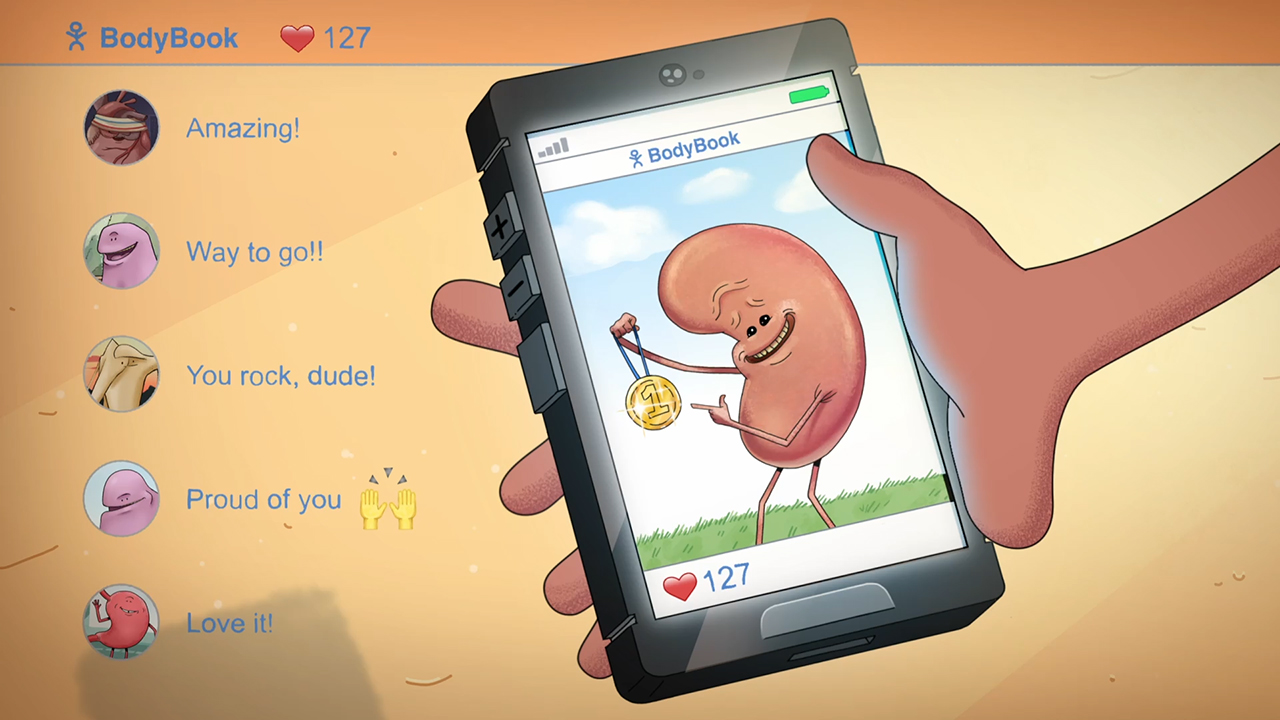DUBLIN--(BUSINESS WIRE)--Horizon Therapeutics plc (Nasdaq: HZNP) today announced the launch of Down and Out Kidney, a campaign to highlight the damaging effects associated with the accumulation of uric acid and gout in people with chronic kidney disease (CKD).
Down and Out Kidney features an immersive animated video that casts the kidney as the unsuspecting lead character whose growing interaction with uric acid endangers not only himself, but his friends – foot, hand, bone and heart. The novel approach aims to facilitate a conversation with nephrologists about the connection between the kidneys, uric acid and subsequent body-wide urate-burden complications, while drawing attention to the latest research.
“Gout has been linked to many comorbidities, including chronic kidney disease, however advancing data and research has enabled us to better understand gout’s impact on the kidneys and other organs,” said Jeffrey Kent, M.D., FACP, FACG, executive vice president, medical affairs and outcomes research, Horizon. “As an often overlooked and undertreated disease, calling attention to the disastrous consequences of gout requires a new conversation. The Down and Out Kidney campaign strives to incite discussion about what happens when uric acid goes unchecked, especially when the kidney is impaired.”
The kidneys are responsible for nearly 70 percent of the body’s daily uric acid excretion, with only 10 percent of uric acid actually leaving the body and the remaining being reabsorbed back into the bloodstream.1 When the kidney function declines, as in CKD, it becomes more difficult for uric acid to be cleared from the body and a higher likelihood the person develops gout.2 In fact, NHANES survey data has shown that there is a tenfold increase in the prevalence of gout among people who have moderate-to-severe CKD compared to those with normal kidney function.3 Additionally, recent analysis of a prospective study of CKD patients found that the risk of renal failure increased by 28 percent for every 1 mg/dL increase in baseline uric acid levels.4
“As clinicians we recognize that chronic kidney disease makes gout worse, though in our training as nephrologists, gout is not discussed as a problem that should be urgently addressed,” said Payam Shakouri, M.D, a nephrologist at Advanced Kidney Care of Hudson Valley. “However, when you look at the data – that one in four moderate-to-severe chronic kidney disease patients has gout – it is clear we need to shift how we view and manage gout. The research implores us to recognize and address disease progression risks associated with gout in the chronic kidney disease patients we see every day.”
About Horizon
Horizon is focused on researching, developing and commercializing medicines that address critical needs for people impacted by rare and rheumatic diseases. Our pipeline is purposeful: we apply scientific expertise and courage to bring clinically meaningful therapies to patients. We believe science and compassion must work together to transform lives. For more information on how we go to incredible lengths to impact lives, please visit www.horizontherapeutics.com, follow us @HorizonNews on Twitter, like us on Facebook or explore career opportunities on LinkedIn.
References
- Bobulescu, I. A., & Moe, O. W. Renal transport of uric acid: evolving concepts and uncertainties. Adv Chronic Kidney Dis. 2012 Nov;19(6):358-71.
- Terkeltaub R, Bushinsky DA, Becker MA. Recent developments in our understanding of the renal basis of hyperuricemia and the development of novel antihyperuricemic therapeutics. Arthritis Res Ther. 2006;8 Suppl 1:S4.
- Krishnan E. PLoSOne. 2012;7(11):e50046.
- Oh, T.R., Choi, H.S., Kim, C.S. et al. Hyperuricemia has increased the risk of progression of chronic kidney disease: propensity score matching analysis from the KNOW-CKD study. Sci Rep. 2019 Apr 30;9(1):6681.





